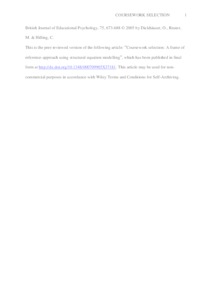|
Coursework selection: A frame of reference approach using structural equation modelling
Dickhäuser, Oliver
;
Reuter, Martin
;
Hilling, Christine
![[img]](https://madoc.bib.uni-mannheim.de/42581/2.hassmallThumbnailVersion/British%20Journal%20of%20Educational%20Psychology/Coursework%20selection%20%282005%29.pdf)  Vorschau |
|
PDF
British Journal of Educational Psychology/Coursework selection (2005).pdf
- Angenommene Version
Download (223kB)
|
|
DOI:
|
https://doi.org/10.1348/000709905X37181
|
|
URL:
|
https://madoc.bib.uni-mannheim.de/42581
|
|
Weitere URL:
|
http://onlinelibrary.wiley.com/doi/10.1348/0007099...
|
|
URN:
|
urn:nbn:de:bsz:180-madoc-425812
|
|
Dokumenttyp:
|
Zeitschriftenartikel
|
|
Erscheinungsjahr:
|
2010
|
|
Titel einer Zeitschrift oder einer Reihe:
|
British Journal of Educational Psychology
|
|
Band/Volume:
|
75
|
|
Heft/Issue:
|
4
|
|
Seitenbereich:
|
673-688
|
|
Ort der Veröffentlichung:
|
Oxford [u.a.]
|
|
Verlag:
|
Wiley-Blackwell
|
|
ISSN:
|
0007-0998 , 2044-8279
|
|
Sprache der Veröffentlichung:
|
Englisch
|
|
Einrichtung:
|
Fakultät für Sozialwissenschaften > Pädagogische Psychologie (Dickhäuser 2008-)
|
|
Fachgebiet:
|
150 Psychologie
|
|
Freie Schlagwörter (Englisch):
|
academic-achievement , academic-self-concept , choice-behaviour , dimensional-comparison
|
|
Abstract:
|
Background. Choice behaviour has far-reaching consequences on students’ educational careers. Previous models on course selection -- like the model of achievement-related choices (Wigfield & Eccles, 2000) and self-efficacy-theory (Bandura, 1997) -- stress the importance of ability-perceptions (self-concept of ability) as a major determinant of choice.
Aim. The article suggests a model of course selection, which assumes, that comparisons within an internal frame of reference (which were proposed by Marsh, 1986, for the association between achievement and self-concepts) also can be applied on the association between self-concepts and course selection. Therefore it is hypothesised that course selection is not only positively influenced by the self-concept with respect to the corresponding subject but also negatively by the self-concept with respect to alternative subjects. Moreover it should be tested, if the effects of previous achievement on course selection are completely mediated by the self-concepts.
Sample. The assumptions were empirically tested using a sample of 296 students from secondary school classes who could specialize for example in Chemistry or Biology in the next term.
Method. Self-concepts and course selection were assessed via questionnaire. The postulated models were tested using a structural equation modelling approach for ordinal variables. Results. The core assumption, that course selection is determined by dimensional comparisons was supported by significant negative paths from self-concepts on the selection of non-corresponding subjects. Moreover, the effects of previous achievement on selection were completely mediated by self-concepts.
Conclusion. Previous models of choice behaviour should be extended, by considering not only the selected alternatives but also the unselected ones. The finding that the influence of achievement on choice is completely mediated by self-concepts demonstrates, that subjective interpretations of previous achievement influence subsequent behaviour.
|
 | Dieser Eintrag ist Teil der Universitätsbibliographie. |
 | Das Dokument wird vom Publikationsserver der Universitätsbibliothek Mannheim bereitgestellt. |
 Suche Autoren in Suche Autoren in
Sie haben einen Fehler gefunden? Teilen Sie uns Ihren Korrekturwunsch bitte hier mit: E-Mail
Actions (login required)
 |
Eintrag anzeigen |
|
|
 ORCID: 0000-0002-3126-8398 ; Reuter, Martin ; Hilling, Christine
ORCID: 0000-0002-3126-8398 ; Reuter, Martin ; Hilling, Christine



 Suche Autoren in
Suche Autoren in